
Bactria, or Bactriana, was an ancient Iranian civilization in Central Asia based in the area south of the Oxus River and north of the mountains of the Hindu Kush, an area within the north of modern Afghanistan. Bactria was strategically located south of Sogdia and the western part of the Pamir Mountains. The extensive mountain ranges acted as protective "walls" on three sides, with the Pamir on the north and the Hindu Kush on south forming a junction with the Karakoram range towards the east.
This article concerns the period 159 BC – 150 BC.
Year 160 BC was a year of the pre-Julian Roman calendar. At the time it was known as the Year of the Consulship of Gallus and Cethegus and the Fourth Year of Houyuan. The denomination 160 BC for this year has been used since the early medieval period, when the Anno Domini calendar era became the prevalent method in Europe for naming years.

Demetrius I Anicetus, also called Damaytra was a Greco-Bactrian and later Indo-Greek king, who ruled areas from Bactria to ancient northwestern India. He was the son of the Greco-Bactrian Kingdom's ruler Euthydemus I and succeeded him around 200 BC, after which he conquered extensive areas in what is now southern Afghanistan, Iran and Pakistan and India.

Menander I Soter was a Greco-Bactrian and later Indo-Greek King who administered a large territory in the Northwestern regions of the Indian Subcontinent and Central Asia. Menander is noted for having become a patron and convert to Greco-Buddhism and he is widely regarded as the greatest of the Indo-Greek kings.

Prusias I Cholus was a king of Bithynia, who reigned from c. 228 to 182 BC.

The Indo-Greek Kingdom, also known as the Yavana Kingdom, was a Hellenistic-era Greek kingdom covering various parts of modern-day Afghanistan, Pakistan and northwestern India. It existed from c. 200 BC to c. 10 AD.
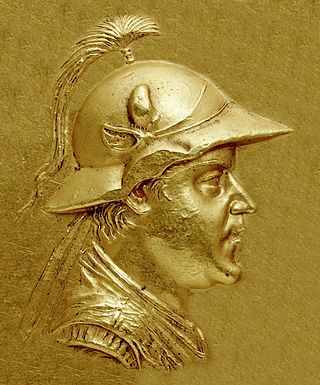
Eucratides I, also called Eucratides the Great, and Evukratida in Indian sources, was one of the most important Greco-Bactrian kings. He conquered large parts of northern India, and minted a vast and prestigious coinage, suggesting a rule of considerable importance and prosperity. His immediate successors were the last Greek kings to rule in Bactria.
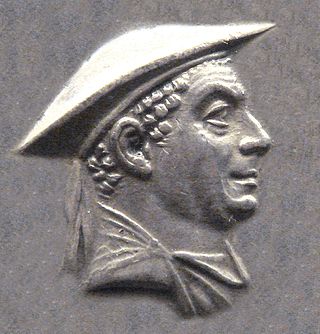
Antimachus I Theos was one of the Greco-Bactrian kings, generally dated from around 185 BC to 170 BC.

Brihadratha was the 9th and last Emperor of the Mauryan Dynasty. He ruled from 187 to 185 BCE, when he was overthrown and assassinated by his General, Pushyamitra Shunga, who went on to establish the Shunga Empire. The Mauryan territories, centred on the capital of Pataliputra, had shrunk considerably from the time of Ashoka to when Brihadratha came to the throne.

Demetrius II was an Indo-Greek king who ruled briefly during the 2nd century BC. Little is known about him and there are different views about how to date him. Earlier authors such as Tarn and Narain saw him as a son and sub-king of Demetrius I, but this view has now been abandoned.

Eucratides II was a Greco-Bactrian king of the 2nd century BC who was a successor, and probably a son, of Eucratides I. It seems likely that Eucratides II ruled for a relatively short time after the murder of his namesake, until he was dethroned in the dynastic civil war caused by the same murder, since Justin reports:
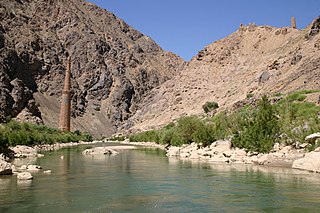
The Battle of the Arius was an engagement that was fought in 208 BC between the Seleucid Empire and the Greco-Bactrian Kingdom. The Seleucids were led by Antiochus III the Great, who launched an invasion of Bactria to recover his ancestor's past dominions. He would go on to be victorious in this battle, and would later go on to besiege the Bactrians at their capital of Bactra for three years.
Within the Indo-Greek Kingdom there were over 30 kings, often in competition on different territories. Many of them are only known through their coins.

The History of the Indo-Greek Kingdom covers a period from the 2nd century BCE to the beginning of the 1st century CE in northern and northwestern Indian subcontinent. There were over 30 Indo-Greek kings, often in competition on different territories. Many of them are only known through their coins.

The sources which are used to reconstruct the history of the Indo-Greeks are few and disparate, leading to much uncertainty about the precise state of the Indo-Greek kingdom and its chronology. Sources related to the Indo-Greeks can be classified into various categories: ancient literary sources from both the West and the Indian world, archaeological sources from the general area of present day Pakistan, Kashmir and North Indian states of Punjab, Haryana, Himachal Pradesh, Uttar Pradesh & Bihar, and numismatical sources, which are abundant and well-preserved but often rather cryptic.

The Seleucid–Parthian Wars were a series of conflicts between the Seleucid Empire and the Parthian Empire which resulted in the ultimate expulsion of the Seleucids from the Iranian Plateau and the surrounding regions. The wars were caused by the mass migration of the nomadic Iranian Parni tribe into Parthia and the establishment of the Parthian state, which challenged Seleucid hegemony.

The Greco-Bactrian Kingdom was a Greek state of the Hellenistic period located in Central Asia. Along with the Indo-Greek Kingdom in the Indian subcontinent, it was the easternmost part of the Hellenistic world. The kingdom was founded c. 256 BC by the Seleucid satrap Diodotus I Soter and lasted until its fall c. 120 BC. It was ruled by the Diodotid dynasty, Euthydemid dynasty, and the Eucratid dynasty.
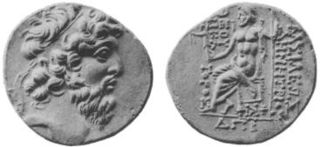
The Seleucid Dynastic Wars were a series of wars of succession that were fought between competing branches of the Seleucid royal household for control of the Seleucid Empire. Beginning as a by-product of several succession crises that arose from the reigns of Seleucus IV Philopator and his brother Antiochus IV Epiphanes in the 170s and 160s, the wars typified the final years of the empire and were an important cause of its decline as a major power in the Near East and Hellenistic world. The last war ended with the collapse of the kingdom and its annexation by the Roman Republic in 63 BC.
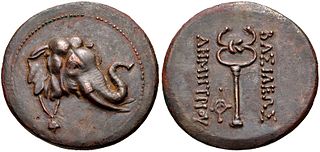
The Euthydemid dynasty was a Hellenistic dynasty founded by Euthydemus I in 230 BC which ruled the Greco-Bactrian and Indo-Greek kingdoms throughout the Hellenistic period from 230 BC to 10 AD, upon the death of its last ruler, Strato III in Gandhara.















